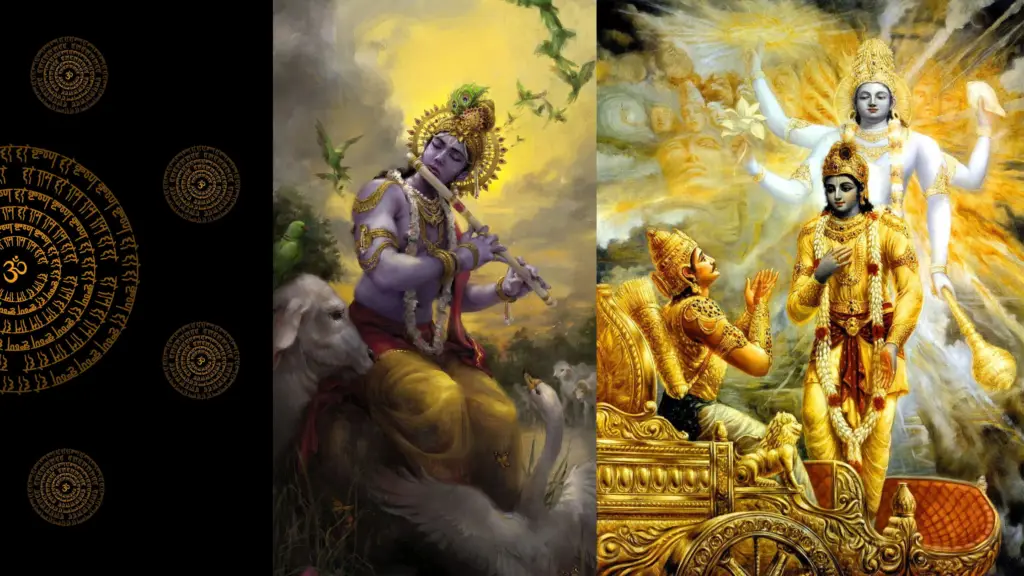Discover powerful strategies for effective stress management in our comprehensive guide. Learn mindfulness meditation, deep breathing exercises, and more to cultivate inner peace and resilience. Dive into timeless wisdom from the Bhagavad Gita for holistic approaches to handling stress.
Table of Contents
ToggleIntroduction
It’s a four-letter word that can wreak havoc on our physical and mental well-being. In today’s fast-paced world, we’re constantly bombarded with demands, deadlines, and uncertainties. This can leave us feeling overwhelmed, anxious, and exhausted.
But what if there was a way to manage stress and achieve inner peace, even amidst the chaos? The wisdom of the Bhagavad Gita, an ancient Indian scripture, offers timeless principles for handling stress that are still relevant today.
The Bhagavad Gita tells the story of Arjuna, a warrior prince, who experiences immense stress and doubt on the battlefield. Through his celestial charioteer, Krishna, he receives divine guidance on how to fulfill his duty while maintaining inner peace.
The Bhagavad Gita, often referred to as the “Song of the Divine,” is a timeless spiritual text that offers profound insights into the human condition and the nature of existence. Within its verses lie timeless wisdom that can be applied to various aspects of life, including stress management. In this post, we’ll explore how the teachings of the Bhagavad Gita provide valuable perspectives and strategies for handling and managing stress.

What are the main causes of Stress & Anxiety?
Here are the main causes or factors of Stress and Anxiety-
Attachment (Raga): Attachment, or Raga, refers to clinging to specific outcomes, desires, or expectations. When individuals become overly attached to certain results or possessions, they set themselves up for disappointment and anxiety when those expectations are not met. The Bhagavad Gita emphasizes the importance of performing one’s duties without attachment to the results, as attachment leads to bondage and suffering. Letting go of attachment and practicing detachment can help alleviate stress and cultivate inner peace.
Desire and Craving (Trishna): Desire and craving, or Trishna, arise from the endless pursuit of sensory pleasures and worldly possessions. When individuals are driven by insatiable desires, they experience anxiety and restlessness, constantly seeking external validation and fulfillment. The scriptures teach that true happiness lies not in the fulfillment of desires but in inner contentment and spiritual realization. By transcending desires and finding satisfaction within, one can overcome stress and attain lasting happiness.
Fear of Loss (Bhaya): Fear of loss, or Bhaya, is another common cause of stress and anxiety. Individuals often worry about losing their loved ones, possessions, status, or security, leading to a constant state of apprehension and insecurity. The scriptures teach that fear arises from ignorance and attachment to the transient aspects of life. By recognizing the impermanent nature of the material world and cultivating faith in the divine order of the universe, one can overcome fear and find inner strength and resilience.
Ignorance (Avidya): Ignorance, or Avidya, is considered the root cause of all suffering according to the scriptures. When individuals are ignorant of their true nature as eternal spiritual beings and identify solely with their temporary material bodies and roles, they experience stress and anxiety. The Bhagavad Gita teaches the importance of self-awareness and spiritual realization, guiding individuals to transcend the cycle of birth and death and attain liberation from suffering. By cultivating knowledge and understanding of the self and the universe, one can overcome ignorance and find lasting peace.
Egoism and Pride (Ahankara): Egoism and pride, or Ahankara, arise from a false sense of identification with the ego and the illusion of separateness. When individuals are driven by egoistic tendencies and pride, they experience stress and anxiety stemming from the need to defend and uphold their self-image and identity. The scriptures teach the importance of humility and selflessness, guiding individuals to transcend the ego and recognize the interconnectedness of all beings. By letting go of egoistic attachments and surrendering to the divine will, one can find freedom from stress and experience true inner peace.
Lack of Faith and Trust (Ashraddha): Lack of faith and trust, or Ashraddha, is another underlying cause of stress and anxiety. When individuals lack faith in themselves, others, or the divine order of the universe, they experience insecurity and doubt, leading to stress and worry. The scriptures emphasize the importance of cultivating faith and trust in the divine plan, guiding individuals to surrender their worries and anxieties to a higher power. By developing unwavering faith and trust, one can overcome stress and find solace in the belief that everything happens for a reason and serves a higher purpose.
By understanding and addressing these underlying causes of stress and anxiety, individuals can cultivate inner peace, resilience, and spiritual growth, as advocated by the teachings of the Bhagavad Gita and other scriptures.

What are the ways to relieve Stress and Anxiety?
Here are the ways of relieving stress and anxiety-
Self-awareness and Detachment:
One of the central teachings of the Bhagavad Gita is the concept of self-awareness and detachment. Krishna advises Arjuna to perform his duties without attachment to the outcomes, emphasizing the importance of focusing on the present moment rather than worrying about the future. Similarly, in the face of stress, cultivating self-awareness can help us detach from the incessant chatter of the mind and find peace in the present moment. By letting go of our attachment to specific outcomes, we can reduce stress and embrace life’s uncertainties with equanimity.
Yoga of Action (Karma Yoga):
Karma Yoga, the yoga of selfless action, is another key teaching of the Bhagavad Gita. According to Krishna, performing our duties without selfish desires leads to liberation from the cycle of birth and death. In the context of stress management, Karma Yoga teaches us to focus on the action itself rather than being consumed by the results. By dedicating ourselves wholeheartedly to our tasks without expectation of reward, we can free ourselves from the burden of stress and experience inner peace.
“Karmanye vadhikaraste ma phaleshu kadachana Ma karma phala hetur bhur ma te sangostva karmani”
It means-
“You have a right to perform your prescribed duties, but you are not entitled to the fruits of your actions. Never consider yourself to be the cause of the results of your activities, nor be attached to inaction.”
Equanimity in Adversity (Sam-Bhava):
Throughout the Bhagavad Gita, Krishna emphasizes the importance of maintaining equanimity in the face of adversity. He advises Arjuna to remain steadfast in his duty as a warrior, regardless of the circumstances. Similarly, when confronted with stress, we can draw upon this teaching to remain calm and composed, trusting in the divine order of the universe. By cultivating a sense of equanimity, we can navigate through life’s challenges with grace and resilience.
“Shukh dukhe same kritwa labha labhau jaya ajyau Tato yuddhaya yujyasva naivam papam avapsyasi”
It means:
“Treat alike happiness and sorrow, gain and loss, victory and defeat; Engage in battle thus, and you will not incur sin.”

The Yoga of Meditation (Dhyana Yoga):
Dhyana Yoga, the yoga of meditation, is another powerful tool for stress management found in the Bhagavad Gita. Krishna instructs Arjuna to seek refuge in meditation to attain peace and clarity of mind. Just as Arjuna finds solace in meditation amidst the battlefield, we too can find refuge from it by turning inward and connecting with our innermost selves. Through regular meditation practice, we can quiet the mind, reduce stress, and cultivate a sense of inner peace.
“Yogi yunjita satatam Atmanam rahasi sthitaha Ekaki yata-cittatma Nirasir aparigrahaha”
It means-
“The yogi should constantly engage in meditation, remaining secluded and alone, with mind and body subdued, and free from desires and possessions.”
Surrender to the Divine Will (Samarpan-Bhava) :
Surrendering to the divine will is a central theme in the Bhagavad Gita. Krishna urges Arjuna to surrender his ego and desires to the higher power, trusting in the divine plan. Similarly, when faced with it, we can find relief by surrendering our worries and anxieties to a higher power. By relinquishing control and placing our trust in the divine order of the universe, we can alleviate stress and experience a profound sense of peace and acceptance.
“Sarva-dharman parityajya Mam ekam sharanam vraja Aham tvam sarva-papebhyo Mokshayishyami ma suchaha”
It means-
“Abandon all varieties of dharma and simply surrender unto me. I shall deliver you from all sinful reactions. Do not fear.”
Regular Exercise (Sharirik-Shram):
Physical activity is not only essential for our physical health but also plays a crucial role in stress management. Exercise releases endorphins, the body’s natural stress relievers, helping to alleviate feelings of anxiety and tension. Aim for at least 30 minutes of moderate exercise most days of the week, whether it’s walking, jogging, swimming, or yoga. Find activities that you enjoy and make them a regular part of your routine.
Healthy Lifestyle Choices:
Maintaining a healthy lifestyle is key to managing it effectively. This includes eating a balanced diet, getting enough sleep, and avoiding excessive alcohol and caffeine consumption. Poor lifestyle habits can exacerbate stress and make it more difficult to cope with life’s challenges. Focus on nourishing your body with nutritious foods, prioritizing sleep, and practicing moderation in your consumption of stimulants.
Effective Time Management:
Feeling overwhelmed by a never-ending to-do list can contribute significantly to stress. Learning to manage your time effectively can help alleviate this burden and create a sense of control over your life. Start by prioritizing tasks, breaking them down into manageable chunks, and setting realistic deadlines. Use tools such as to-do lists, calendars, and time-blocking techniques to organize your day and maximize productivity.
Seek Guidance & Support:
Don’t hesitate to reach out for guidance & support when you’re feeling overwhelmed by stress. Whether it’s talking to a trusted friend or family member, seeking guidance from a therapist, or joining a support group, connecting with others can provide valuable perspective and validation. Remember, you don’t have to face your challenges alone, and seeking support is a sign of strength, not weakness.

Conclusion:
Managing stress effectively is a skill that requires practice and dedication, but the benefits are well worth the effort. Remember, it is a natural part of the human experience, but it doesn’t have to control your life. With the right tools and mindset, you can learn to manage it effectively and thrive in all aspects of your life.
The teachings of the Bhagavad Gita offer timeless wisdom and practical guidance for managing it in our modern lives. By cultivating self-awareness, practicing detachment, embracing the yoga of action, maintaining equanimity, engaging in meditation, and surrendering to the divine will, we can navigate through life’s challenges with grace and resilience. Ultimately, by integrating these teachings into our daily lives, we can find inner peace and fulfillment amidst the chaos of the world.
The above post might not have covered all the content and I have tried to cover all the possible ways to relieve the stress and anxiety from my end. Please do comment if any further suggestions or thoughts.
“Hare Rama, Hare Rama, Rama Rama, Hare Hare, Hare Krishna, Hare Krishna, Krishna Krishna, Hare Hare”












Excellent work ❤️🎉✌️
Hi Anjul,
Thank you so much for your complements and thanks for visiting to this website and this is my motivation to do my best.
Regards!
Eternal Shri Krishna
Covered all what I needed thank you so much for the content